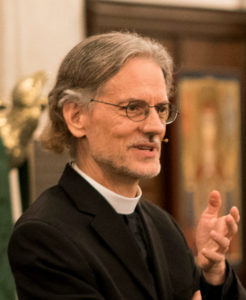Prayers of the Faithful
In many contemporary churches, the liturgy of the Eucharist includes a time of intercession for the church and the world. Called by various names, including “Prayers of the Faithful” and “Prayers of the People,” these intercessions are the portion of the liturgy most likely to change from week to week or from place to place. They are open-ended.
About a year ago, in a parish in Florida, I encountered a variation in the prayers that I think is worthy of wider use. Following intercessions for the wider church and concerns of the world, the focus turned to the parishioners themselves.
The congregants prayed first for the sick and the hospitalized among them. Then they prayed for those preparing to receive the sacrament of marriage and after that for “those expecting a child.” The names of eight couples were read.
This in turn was followed, logically, as it were, by prayers for those celebrating their birthday. And there were prayers for others on the anniversary of their death. (This also has a certain logic, since the date of a Christian’s death is sometimes reckoned their birthday into greater life with God.)
Preparing for marriage. Expecting a child. A birthday. The anniversary of a death. These four subjects of intercession constitute a concise pro-life catechesis.
Marriage is the human matrix for life. Those who are called to marriage—and not everyone is—are called to a divine institution; they need grace to prepare for it and enter it rightly.
Children are hoped for in a marriage, and, once conceived, are “expected.” Not all children are born within a marriage, nor do all children have parents who “expect” them. But to pray for women or couples who are expecting a child is to do a godly act.
Then comes birth and the annual celebration of our natal anniversary. To remember each other on our birthdays is a small way to support one another all of our days. I know a priest (at a different parish) who likes to say at a birthday gathering, following a prayer or a song: “We’re glad you were born.” Despite whatever hardships one has in life, it is good to celebrate our birthdays. In the pits of his misery, Job did the opposite. He cursed the day of his birth; he asked for that day to be removed from the calendar (see Job, Chap. 3). Job of course was wrong, although we can understand why he said these things (and we hope that we would have responded to him better than his friends did).
Finally, this life ends, and we turn the departed over to the Lord. The day of death is, I think, of equal importance to the day of birth, if not more so. (Old tombstones record the date of death and, if known, the age of the deceased, but not his or her date of birth.) No matter how we think of what happens after death, that day is the day of being placed definitively and forever in God’s hands.
All of us who are involved in the cause of life know that our proper concern is not only with those initial months of life in the womb. We are concerned with local societies, with the homes where God’s people dwell, with marriages, with mothers and fathers who are “expecting,” with the stages and years of life, and with the eternal significance of life in God. These are all pro-life concerns, and they rightly shape our prayers.










